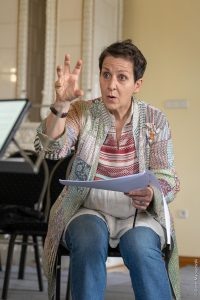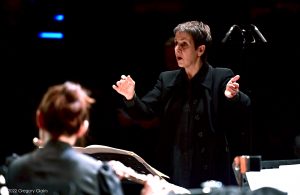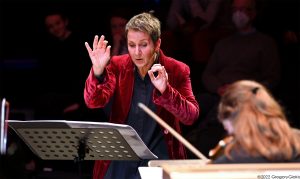Empathic coexistence of sound
Konstantia Gourzi - Composer・Conductor
A biographical Essay
"Music should convey a wealth of feelings, hope, expansion of consciousness, fantasy, life and love to people. It is important to me to use sound to activate the positive forces inherent in us. Accompanying this process is an exhilarating experience for me."
For the composer and conductor Konstantia Gourzi, who was born in Athens and lives in Germany, one of the most important criteria for her own artistic path was already part of her studies in Berlin in the 1980s. This was, and is, openness to the search for the highest quality of sound regardless of its origin, in inner integrity and artistic authenticity, free from dogmas and guidelines. The cultural and historical diversity that music can express, and which is part of life as a whole, has always been an inspiration for her. The starting point for her artistic work is respect and curiosity for other musical cultures. For Konstantia Gourzi, music does not look at origins; it does not judge and has the power to unite people. Konstantia Gourzi therefore draws inspiration for her works from different styles and traditional instruments as well as from the international avant-garde with its dramaturgies of sound, noise and structure based on the development of modern instruments.

The ever-active composer also often draws creative inspiration from social and spiritual themes, Greek mythology and the sounds and vibrations of nature. Her works are imbued with a certain dramaturgical structure with the desire to open up new spaces and energies through sound. Her compositions are like “narratives of sincere communications”, as she herself says, encouraging listeners and society to empathically expand their own perception. With her unmistakable contemporary voice, Konstantia Gourzi opens up spaces for the audience to feel and reflect in a rational everyday life.
Experiences along the way
It seems no accident of fate that Konstantia Gourzi became, in Athens, a composition student Michael Travlos – a former student of Isang Yun, with whom she would be in close contact years later. Throughout his life, Yun had tried to fuse the ancient traditions of his Korean homeland with contemporary impulses: traditional roots interacted with the revolutionary search for and exploration of new stylistic means. This could also be a motto for Konstantia Gourzi’s work and forms a driving force behind her search for identity.
In 1987, she came to Berlin to study composition and very soon recognized the need to define herself artistically and to find her own compositional path. She felt thrown back on herself. But Germany’s musical life had much more to offer: a course with Diether de la Motte in Darmstadt gave her freedom and new hope, and immersing herself in György Kurtág’s life-enhancing miniature cosmos opened up unexpected new perspectives. At the same time, she studied conducting in Berlin. Although her university studies were rather sobering for her, she attended almost all rehearsals of the Berlin Philharmonic Orchestra for four years, full of enthusiasm and curiosity. This was a decisive experience: concrete moments of creating music at the highest level, especially when Claudio Abbado, with whom she assisted, showed her “how music can breathe”. She also received defining musical impulses from Carlos Kleiber, Günter Wand, Giuseppe Sinopoli, Sylvia Caduff, Carlo Maria Giulini, Michael Gielen, Bernard Haitink and Nikolaus Harnoncourt.
Ensemble founder and professor
Konstantia Gourzi is that rare yet extremely fruitful combination of composer, conductor and professor. She knows how to continuously pursue many strands in parallel, to implement and develop intelligent and creative concepts step by step, to give her ensembles a clear identity, and to secure respect and approval from all sides with the high quality of her work. She also benefits from her ability to organize prudently and with foresight, to work purposefully and to communicate empathetically. She acts as a role model for the younger generation, as she was the first woman to conduct Traviata at the Athens State Opera in Greece in the 1990s.

The longing to experiment more with like-minded people in order to experience new sounds quickly led her to want to create and lead various musical formations herself. In 1991, she founded the ensemble ‘attacca berlin’ and the international concert series ‘Zeitzonen’. From 1999 to 2007, she set up and directed the ‘Echo’ ensemble at the Hanns Eisler School of Music in Berlin. In 2002, Konstantia Gourzi was appointed Professor of Ensemble Conducting and New Music at the University of Music and Performing Arts in Munich. With her impressive versatility and verve, she soon became a central pillar of new music life in the Bavarian capital and beyond. Her first important decision in Munich was the founding of the ‘ensemble oktopus’, made up of students, which she has directed ever since. Today is is impossible to imagine Munich’s cultural life without this ensemble with its stylistic flexibility and high interpretative standards.
She gives her students a feel for contemporary music in all its facets. She supports all young musicians who demonstrate a genuine interest in building an authentic relationship with the new and unpredictable, and is available to them as a reliable and inspiring mentor. In 2007, she founded the network and ensemble ‘opus21musikplus’, in which contemporary music enters into an exchange with other art forms and musical genres. Konstantia Gourzi is internationally acclaimed as a conductor who never shies away from a challenge and, with her many years of experience, conducts outstanding performances with precision and brilliance. Radio recordings, television broadcasts and live streams document her artistic path as well as her collaboration with labels such as ECM, GENUIN, NEOS and Sony Classical.
Composer
In her compositions, Konstantia Gourzi explores the intuitive regions of the human mind by means of musical and psychological phenomena in all their inexhaustible range. She is just as concerned with making a clear statement through music as she is with creating an intimate musical experience. This means that in addition to a sophisticated dramaturgy, intuition and feeling always play a key role in the creative process. Her aim is to transcend the boundaries of the rational and definable in her music and to merge topicality and timelessness into an indissoluble unity.

In recent years, she has increasingly focused on curating new program concepts as a composer and conductor: As “Composer in Residence”, including at the Grafenegg Festival 2020 in Austria, the Molyvos International Music Festival in Greece 2021, the Kreisau Festival 2022 in Poland and as “Composer and Conductor in Residence” 2023 with the Duisburg Philharmonic Orchestra for the Eigenzeit Festival with a transcultural “Call for Compositions”, Konstantia Gourzi repeatedly conjures up dreamlike magical worlds that seem like magical rituals from another world. This other world appears like a current in the world we know, which makes reality appear to us in a different light and subtly helps to free us from conditioned perception.
As she says, Konstantia Gourzi draws her motivation as a composer “from a force that is stronger than my consciousness and constantly urges me to unite worlds and express them musically. It feels like a secret, like something hidden that wants to be expressed. At the same time, it forces me to look for a connecting line between yesterday and today. Our roots, including our musical roots, are part of our ego. And by becoming aware of our own, we can accept the Other without demanding that they change, in order to find something in common. I contribute to this by bringing together sounds and attitudes from different religions and cultures, which I allow to take shape as a sound coexistence.”
Christoph Schlüren,
updated november 2023 by Dr. Susanna Schulz
